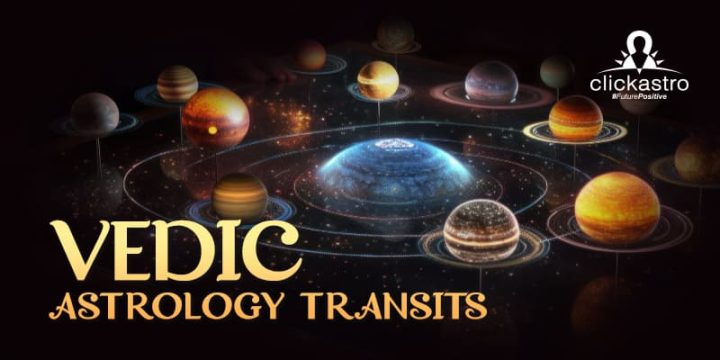The popularity of Vedic astrology is increasing day by day due to its tremendous strength to transform lives. It has all the information about human lives, which can help bring out the best in the native. There are so many components in
Vedic astrology that will help us understand what our life is and what we should change. One of its key components is the study of planetary transits and their profound impact on an individual’s life.
Transits are very easy but very important transits in astrology, which can be easily understandable to anyone. In Vedic astrology, we give first place to the placement, aspect, and conjunction in the birth horoscope, as it shows the promises in life. Transits, on the other hand, represent the ongoing movements of planets and their changing relationships with the birth positions of
planets in an individual’s birth chart. We need to first understand the promises in the horoscope and then only transit. Transits show the time when the promises in the birth horoscope get activated.
Some transits last for weeks, but some transits last for years.
The duration of planetary transits varies significantly depending on the planet’s orbital speed and the specific transit being observed. Here’s a general overview of the approximate time periods for transits of each of the major planets in our solar system
Time periods for transits
Sun:
The
Sun moves through each zodiac sign roughly once a month, so its transit through a sign lasts approximately 30 days.
Moon:
The Moon transits through each zodiac sign in about 2.5 days, so its transit through a sign is quite brief.
Mercury:
Mercury’s transits are relatively frequent due to its faster orbit. It spends around 14–30 days on each sign.
Venus:
Venus moves through the zodiac at a moderate pace, spending approximately 23–60 days in each sign, depending on its retrograde motion.
Mars:
Mars has more extended transit duration, spending about 1.5 to 2 months (45–60 days) in each sign.
Jupiter:
Jupiter’s transits are relatively lengthy. It spends approximately 12–13 months in each sign, leading to a 12-year orbit around the zodiac.
Saturn
Saturn’s transits are even longer, with the planet spending about 2.5 to 3 years (30–36 months) in each zodiac sign. Saturn’s orbit takes approximately 29.5 years to complete.
Uranus, Neptune, and Pluto:
These outer planets have much longer transit durations. Uranus spends about 7 years in each sign, Neptune around 14 years, and Pluto about 21 years.

It’s important to note that while the above durations provide a general idea of how long planets stay in each sign, the actual timing may vary slightly due to the eccentricities of planetary orbits and retrograde motion. Astrologers consider both direct and retrograde motion when interpreting the effects of planetary transits in an
individual’s birth chart. Additionally, the specific effects of a transit depend on the aspects formed with other planets and the birth chart’s positions.
To understand the impact of planetary transits, astrologers create transit charts by superimposing the current
positions of planets onto an individual’s birth chart. This allows them to assess how transiting planets interact with the birth planets and house placements, providing insights into the unfolding events and trends in one’s life.
Duration of Transits
Transits can vary in duration, from brief encounters that last only a few days to more extended periods that span several years. The specific influence of a transit depends on the nature of the planets involved, the signs they occupy, and the aspects they form with the birth planets.
Planetary Aspects in Transits
In Vedic astrology, the aspects between transiting planets and birth planets are of great significance. Planetary aspects are angular relationships that reveal how energies flow between planets. The main aspects considered are conjunctions, sextiles, squares, trines, and oppositions. Each aspect has its unique impact on the individual’s life.
Conjunction:
When a transiting planet aligns closely with a birth planet, it can intensify the qualities associated with that planet. For example, a transiting Mercury conjuncting the birth Sun can enhance communication and intellectual pursuits.
Impact of Transits on Different Areas of Life
Transits have a significant impact on various aspects of life, including:
Career and Finances:
Transits can influence job changes, financial windfalls, or setbacks. For example, a favorable Jupiter transit to the 2nd house can bring financial prosperity.
Relationships:
Changes in marital status, the beginning or end of significant relationships, and the dynamics within partnerships can be influenced by transits. A challenging Saturn transit to the 7th house may indicate relationship difficulties.
Health:
Transits can affect physical and mental well-being. Some transits may bring vitality and good health, while others might indicate health issues that need attention.
Spirituality and Personal Growth:
Transits can prompt inner growth, spiritual awakening, and shifts in consciousness. Beneficial transits to the 9th house often coincide with spiritual insights.
Travel and Relocation:
Positive transits can encourage travel or relocation, leading to new experiences and opportunities. Malefic transits, however, may bring travel-related challenges.
Examples of Notable Transits
Let’s look at a few examples of notable transits and their potential effects:
Saturn Return:
Saturn takes approximately 29.5 years to orbit the Sun. The first Saturn return around age 29-30 is a significant life milestone, often associated with career changes, maturity, and reevaluating life goals.
Jupiter Transit:
A Jupiter transit through the 1st house can boost confidence and personal growth. It’s a time when individuals often embark on new journeys and expand their horizons.
Rahu and Ketu Transits:
The nodes of the Moon, Rahu and Ketu, is known for their karmic influence. Their transits can bring unexpected events and shifts in life direction.
Preparing for Transits
While we cannot control the movements of planets, Vedic astrology emphasizes the importance of awareness and preparedness. Here are some ways to navigate the impact of transits:
Consult an Astrologer:
A
Vedic astrologer can provide insights into upcoming transits and their potential effects on your life.
Remedies:
In Vedic astrology, there are various remedies such as wearing specific gemstones, performing rituals, or chanting mantras to mitigate the challenging effects of transits.
Self-awareness:
Developing self-awareness and mindfulness can help individuals navigate the challenges and opportunities presented by transits with grace and resilience.
Conclusion
In Vedic astrology, transits serve as a valuable tool for understanding the ever-changing landscape of one’s life. By studying the movements of planets in relation to one’s birth chart, individuals can gain insights into the timing of events and make informed decisions. While transits can bring challenges, they also offer opportunities for growth, self-discovery, and the fulfillment of one’s life purpose. Ultimately, Vedic astrology encourages us to embrace the cosmic dance of the planets and find our place within it.
 It’s important to note that while the above durations provide a general idea of how long planets stay in each sign, the actual timing may vary slightly due to the eccentricities of planetary orbits and retrograde motion. Astrologers consider both direct and retrograde motion when interpreting the effects of planetary transits in an individual’s birth chart. Additionally, the specific effects of a transit depend on the aspects formed with other planets and the birth chart’s positions.
To understand the impact of planetary transits, astrologers create transit charts by superimposing the current positions of planets onto an individual’s birth chart. This allows them to assess how transiting planets interact with the birth planets and house placements, providing insights into the unfolding events and trends in one’s life.
It’s important to note that while the above durations provide a general idea of how long planets stay in each sign, the actual timing may vary slightly due to the eccentricities of planetary orbits and retrograde motion. Astrologers consider both direct and retrograde motion when interpreting the effects of planetary transits in an individual’s birth chart. Additionally, the specific effects of a transit depend on the aspects formed with other planets and the birth chart’s positions.
To understand the impact of planetary transits, astrologers create transit charts by superimposing the current positions of planets onto an individual’s birth chart. This allows them to assess how transiting planets interact with the birth planets and house placements, providing insights into the unfolding events and trends in one’s life.








